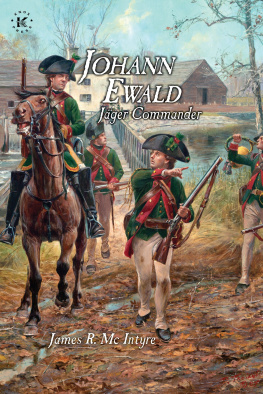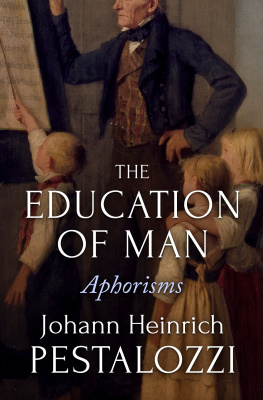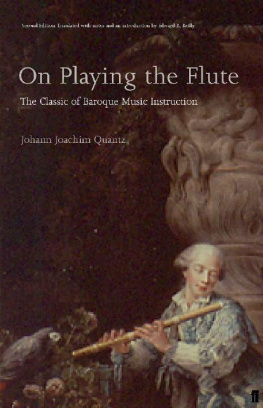
A KNOX PRESS BOOK
An Imprint of Permuted Press
ISBN: 978-1-94849-606-3
ISBN (eBook): 978-1-68261-941-4
Johann Ewald:
Jger Commander
2021 by James R. Mc Intyre
All Rights Reserved
No part of this book may be reproduced, stored in a retrieval system, or transmitted by any means without the written permission of the author and publisher.

Permuted Press, LLC
New York Nashville
permutedpress.com
Published in the United States of America
Too many people to count have helped me in the writing of this book, despite my best efforts to record them all, to make a point of listing them here. In the end, these debts are either professional or personal. It seems only sensible then to address them in that order.
First and foremost, Vincent Rospond at Pike & Powder Publishing Group who was willing to take on the project as publisher and wait patiently almost an additional year for the manuscript. I hope the final product was worth the wait.
This book would not have come together as it did without the assistance of Sue Yach, Interlibrary Loan Representative at the Moraine Valley Community College Library. Sue tracked down numerous obscure pieces for me and helped to locate materials that have greatly enriched the final manuscript. Thomas Gothe at the Landeskirchliche Archiv, Kassel, who guided me to some key materials at a critical juncture. Likewise, the National Archives of Denmark, Copenhagen, which furnished me with a digital copy of Ewalds first Treatise, here translated into English for the first time.
At Temple University, Russell F. Weigley introduced me to academic military history, and demonstrated through example what a great scholar and mentor should be. His memory lives on in these pages, as I hope does some of his professionalism.
At University of Illinois in Urbana-Champaign, John A. Lynn aided my growth as a historian by fostering in me a sense of academic rigor. Many editorial decisions concerning materials included in these pages underwent his litmus test.
Alexander Burns read the entire manuscript and provided insightful comments on the work in progress. He, along with the other members of the Seven Years War Association, including Jude Becker, Ken Bunger, Paul Petri, Jim Purky and the late Dean West have often provided me with stimulating conversation, and at times important resources on the Hessian Army.
The word colleague does not begin to describe the relationships I have enjoyed with my coworkers at Moraine Valley Community College over the years. Kristine Van Baren and Merri Fefles have been remarkable friends as well as supportive colleagues.
My colleagues at the United States Naval War College, College of Distance Education, based in Newport, Rhode Island, K.J. Delamer and Stan Carpenter, have always provided stimulating conversation. Its always a pleasure to talk with two people just as passionate about the American War of Independence. In addition, the seminars I have been fortunate enough to lead through the College of Distance education, have allowed me to further refine ideas, and the astute criticisms of the students have at times forced me to revise my own views on the war, and the conduct of warfare in general.
My mother, Florence Mc Intyre supported my interest in history from the start, and never challenged my choice of the discipline as a career. Instead, she nodded and said it seemed the natural direction for me to take. Likewise, my older brother David, who took me to numerous historical sites and reenactments as a youth. They truly fanned the flames of my passion for history especially that of the nations founding.
Finally, to my wife Catherine, and our children Jessica, Tara and Nathanael. Thank you does not even begin to cover it. You have all listened to me and shown more patience than I could ever hope to expect. I love you all.
A Note on Translations
and Spellings
This work contains a significant amount of translated material. In some respects, I have relied on the works of others, such as Tustins excellent translation of Ewalds Diary from his services in the American War of Independence, and Selig and Skaggs equally erudite translation of his Treatise on Partisan Warfare . In other instances, the translations are my own, either from German or from French. I have not attempted literal translations but instead sought to convey, to the best of my ability, Ewalds intent into English. I submit that this gives a more accurate rendering of Ewalds ideas as he would want his audience to understand them than a literal translation from the original Hessian German of the eighteenth century would make possible. In this regard, I follow the notions put out by the eminent historian Peter Paret concerning his and Sir Michael Howards translation of Carl von Clausewitzs On War . My goal throughout has been to render, as accurately as possible, the meaning Ewald hoped to communicate, based on extensive research into his life and experiences. Any errors in this endeavor are mine and mine alone.
In regard to spellings, I have kept German and French names and terms in their native spellings throughout, including in quotes from primary sources in order to facilitate understanding and maintain consistency. Where they are altered in titles of either primary or secondary works, I have left these as they appear on those works in order to aid in following my research.
Table of Contents
I first came in contact with Johann Ewalds Diary of the American War shortly after giving my first conference paper, on tactics in the American War of Independence. My focus was on the Continental Army and how they evolved over the course of the war. It was suggested by the commentator that if I wanted to develop the topic further, I should read
Ewalds diary.
I was at once struck by several things in Ewalds Diary of the American War . First, Ewalds keen and incisive style as he described the many engagements in which he played a part and the objective manner in which he recorded events. It seemed as if he were always working to distill lessons learned from his experiences. Finally, the sheer breadth of his military career impressed me deeply. All of these factors made me thing, This man truly warrants a biography. At the time, however, it did not seem to be the right project.
Several years later, while reading the translation of a letter between Ewald and his former comrade, John Graves Simcoe, I thought once again about just how much his life and military thought warranted a thorough treatment. The following stands as just such a treatment.
Prior to launching into an account of Ewalds life it is important to establish certain analytical parameters. In order to establish these parameters, it is necessary to provide a brief overview of Ewalds military service.
Johann (later von) Ewald not only served in all the major wars of the latter eighteenth century, he distilled his experiences in them into workable lessons for subsequent generations of officers. Ewald became an expert in what is today referred to as irregular warfare. Despite this expertise he remains generally unknown, even in the realm of military history. Bringing his experiences and the lessons he derived from them to the broader public is the primary purpose of the following work.
Ewald was born in Hessen-Kassel in 1744 and began his military service in 1760 at the age of sixteen. As a result, he participated in the later campaigns of Prince Ferdinand of Brunswick in the Seven Years War. In 1776, he left Hessen-Kassel as part of that states contingent of troops in the British service and fought in the American War of Independence from 1776-1783, being captured at Yorktown and eventually returning to his hmeland. After a period of administrative postings, and a general halt to career advancement, Ewald received permission to enter the Danish service, which he did in 1788. In Denmark, he rose to the rank of brigadier general and acquired a title of nobility. Denmark initially chose to remain neutral during the Wars of the French Revolution and Napoleon. Ewalds initial service to the Danish, therefore, consisted in reforming and training their light infantry. His next combat experience came in the suppression of the uprising of Major Ferdinand von Schill.
Next page









